- Home
- Trevor Hoyle
Down the Figure 7 Page 4
Down the Figure 7 Read online
Page 4
He was tired but he couldn’t get to sleep. The house was full of creakings and the top window-pane kept rattling. He remembered sleeping with his mother in this bedroom before Sylvia was born: the two of them snuggled up together with his body curled to fit the shape of hers, like two coat-hangers side by side. His father was away in the Forces, somewhere in Egypt. One night in particular came back to him: they had been to the Ceylon to see The Man in the Iron Mask, and lying motionless in the dark, all alone together in the house, they kept imagining that the Man in the Iron Mask was creeping slowly up the stairs, coming to get them. They distinctly heard a creaking footfall on the stair, as though he were testing each tread before putting his weight on it, and Barbara, almost as petrified as Terry, murmured in his ear: ‘There’s nobody there really. Go to sleep. It’s only the wind.’ But if it was only the wind, why was she whispering?
Sylvia grunted and slobbered and turned onto her side and the vision was destroyed. He cast about for something else to think about, and thought of Margaret Parry. She was a nice girl, attractive, with lovely dark eyes and a slim figure. He wondered if she was the kind of girl who would be willing to go behind the garages; Dougie Milne said he’d taken Pat Sidebottom (Fat Pat) down the Figure 7 and put his hand up past the elastic in her blue knicker-legs, though Terry didn’t believe him. Everybody knew Dougie Milne was a romancer and told outright fibs. He wondered if Margaret Parry had any hairs on her body. Laura Parfitt had a few: he had caught her peeing in the long grass on the Bottom Track and stopped himself giggling long enough to have a good look.
Terry was restless. He was tired and yet couldn’t sleep, which was odd. He knocked the pillow into shape with his fist and lay down on his stomach, pretending he was in a midget submarine, feeling itchy and uncomfortable between the legs.
Bonfire Night
BESSIE SMITH WAS LADLING BLACK PEAS INTO bowls and cups without handles, her big meaty arms glowing like cured hams in the light from the fire. The little squirts lined up in front of her, their faces grimy from the smoke, lips rosy red where they’d licked the soot away.
The fire was at its height, throwing gigantic shadows against the Arches and the back of the hoardings: a scene from a pagan ritual, a lunatic procession of prancing figures with wild eyes and tangled hair. There was a madness in it somewhere, a kind of imbecilic joy. Kevin Hartley screamed and hoisted a dead branch above his head and threw it into the flames, and the dry wood was instantly consumed, crackling angrily and wafting out fresh waves of heat.
The adults sat on a row of chairs with their backs to the blank end walls of the houses, looking on as fireworks exploded, rockets zoomed, Catherine Wheels whizzed. The old women were muffled in headscarves and heavy coats, their flowered pinnies underneath, some of them wearing clogs and sagging black woollen stockings; and the menfolk stood in small self-important groups, their faces serious and self-contained, trying to look as if they weren’t enjoying it too much.
But Bonfire Night infected everybody: the fire was the centre of everything, to which all eyes were turned: petty jealousies and backyard intrigues were forgotten – or at least laid aside for the time being. Even Dolly Bland, Alec’s mam, who everybody knew had a scandalous reputation, was forgiven her sins for the evening: she stood with Barbara Webb breaking trays of treacle toffee with a small hammer wrapped in cloth and then went along the line of chairs offering the sticky pieces to anybody with the jaws and teeth to withstand them. Sybil Travis and Ivy Kershaw were acting as supply team for big Bessie, ferrying pans of black peas from nearby kitchens, while Dot Hartley was slicing roasted spuds and inserting wedges of margarine; the little kids queued and took them away, juggling the hot charred jackets in their blackened paws; and they weren’t even told to wash before eating!
To Terry, Bonfire Night was second only to Christmas. The smell of woodsmoke seemed to hang everywhere over the town and you only had to walk the length of Entwisle Road to see seven, eight, as many as ten bonfires crackling furiously down sidestreets and back entries and on pieces of waste ground, while in the distance you could hear faint bangs and wails and whoops as fireworks went off in a continuous barrage. As if in accordance with ratified treaty there was never any raiding on the night itself: in fact it was perfectly permissable to visit rival bonfires and throw a few friendly Mighty Atoms, just as the British and German troops had fraternised on that famous Christmas Day during the First World War.
Terry, Alec and Male decided to cross the brook and pay a call on the Gowers Street Gang, whose bonfire they could see through the Arches, not too far away from Tony Shapcott’s pigeon cote. They crept up behind the garages and watched the circle of bright faces, the tots sitting on their parents’ laps, the older kids running in and out and bouncing on the old settees until the springs came through. Tony Shapcott (known as Shap) was setting off rockets, using milk bottles to hold them upright, and behind him, on the edge of the roaring glow where the shadows jumped and trembled, Terry caught sight of Margaret Parry, her face a pink oval blur in the firelight. His heart contracted and he felt a queer feverishness come over him. And when he fumbled for the box of matches in his pocket he discovered that his hands were shaking.
‘Are you going to cob a banger?’ Alec Bland asked.
Terry didn’t answer. Instead he lit the dimp of a Woodbine and leaned against the creosoted timber wall of the garage, in full view. He wanted Margaret Parry to see him there, smoking, watching her; in his mind’s eye he conjured up an image of himself: brown-eyed, sharp-featured, dark wavy hair, about average height for his age, fairly well built. It was a true portrait but slightly romanticised, similar to the one he had when he came out of the pictures and imagined he bore more than a passing resemblance to the hero in the film (Alan Ladd, say), even copying his walk and the way he held his cigarette.
‘It’s some of Denby’s lot,’ said a kid nearby.
Terry appraised him coolly, slouching a little as though wearing a white belted trenchcoat with the collar turned up and a soft fedora hat with a wide brim. He could visualise himself and the effect looked good. He said, ‘Watch yer mouth, young ’un,’ drawling the words and dragging deeply on the dimp. It stuck to his lip and he inadvertantly wrenched it away, drawing blood. The lighted end got caught between his fingers, stinging like buggery, bringing up a couple of blisters.
‘Shap’s seen us,’ Alec said. ‘He’s coming over …’
Terry threw the shredded remains of the dimp away and sucked his fingers.
Shap was a tall firm-shouldered boy with a gleaming quiff of fair hair hanging over his eyes; it was dead obvious he fancied himself as somebody special: a natural leader and a bobby-dazzler with the girls. He came and stood a few feet away, legs braced apart, and regarded them insolently. After all, it was his turf.
‘Come to see a real bommie, Webb?’
‘We might have,’ Terry said. ‘When do you light it?’
‘Bloody sharp, in’t he?’ Shap said to his circle of cronies.
‘Swallowed a bread-knife,’ said one of them.
‘How much wood you got?’ Alec Bland said placatingly. His dreamy brown eyes shifted hesitantly from face to face, a confused mixture of trepidation and mild appeasement.
Beyond Shap’s broad shoulders Terry could see Margaret Parry and her three friends looking his way. The pattern of the flames flickered on her face, the dark eyes glistening inky-black. He wondered if Shap was after plonking it: he wouldn’t mind betting he’d had a grope at least, taking her behind the garages one dark and moonless night and feeling the gentle sprouting of new breasts under the school blouse.
‘Where’s the rest of your mob?’ Shap asked.
Terry jerked his head to indicate the Common across the brook; faint gleams from their bonfire reflected on the undersides of the Arches.
‘Brave, aren’t you, coming over here on your own?’
‘The season of peace and goodwill towards all men,’ Terry said.
‘He’s a poet and do
n’t know it,’ said one of the cronies.
‘Go and fetch ten pounds of potatoes in your cap,’ Terry said glibly, hoping he’d got it right. It was one of his father’s few and far-between jokes, one he trotted out without fail whenever he was in a jovial mood. Terry let his eyes drift about; he felt quite reckless. Margaret Parry was watching and he couldn’t betray any signs of weakness.
‘Hey, tell you what,’ Alec said, ‘why don’t you come and have a sken at our fire,’ smiling vaguely at everybody.
Shap laughed, once. He said: ‘You’d only have to piss on that to put it out.’
‘It’d take more piss than you’ve got,’ Terry said.
‘Yeh?’
‘Yeh.’
‘Oh yeh?’
‘Yeh.’
Alec Bland said, ‘How many piddies have you got now, Shap?’ which was so feeble an attempt at a diversionary tactic that Shap came back without hesitation: ‘What’s it to you, fart-face?’
‘We should be getting back,’ Male said. ‘They’ll be wondering where we’ve got to.’ He said this carefully, as though it had been rehearsed.
One of the cronies jeered, ‘Chicken?’
Shap said, ‘They’re not so tough now, are they, Denby lot, without the big lads to back ’em up.’ He swayed on his heels and grinned with his large yellow teeth, overflowing with confidence.
‘Which big lads would them be?’ a voice said, and it was Spenner, bang on cue like the cavalry, sitting on the roof of the garage with his legs dangling down. Terry looked into Shap’s eyes, fighting to check a smile; it was like a scene in a film, the big dramatic climax when the tables are turned and the baddies have the sneers wiped off their snivelling mugs. The best part was he didn’t need to look at Spenner or even acknowledge his presence, but was strong inside with the warmth of comradeship. It was a good moment.
Kevin Hartley’s uncle, Mr Heap, as self-appointed Master of Ceremonies, made periodic inspections of the store of wood, instructing the Gang what to burn and when, and what to save till later. The lads looked at him in mild astonishment: for 364 days a year he never spoke a word (except to move them on when they were kicking a ball outside his house), and here he was issuing orders as if he’d helped collect the bloody stuff.
Several supporting timbers collapsed inwards and a cloud of sparks erupted from the fiery depths and was borne aloft by the cool night breeze. Smoke hung like a menacing wraith over the garages, the cinder track, the scrub of dead vegetation, drifting under the brick archways and across the black sliding river to lose itself somewhere over the ash-tips.
A Roman Candle ejected three blobs of colour into the sky: red, blue, green, and they faded away inconsequentially in sooty wisps.
Terry’s dad never came to the bonfire, just as he never went anywhere else. He might lean on the railings at the end of Cayley Street for half an hour but he wasn’t a mixer and found it difficult to sustain a conversation beyond the most trivial social pleasantries. Terry spotted him leaning there and ran across.
‘Did you see that Roman Candle go off, dad?’ He couldn’t contain his excitement: it made his eyes round and shiny and his voice squeaked half an octave up the register.
Joe said, ‘Where are your fireworks?’
‘I’ve set ’em off.’
‘A full five bob box?’ His father’s heavy pallid face showed a measure of disapprobation – but only for a moment – because tonight was Bonfire Night, time out of time, immune to the everyday pressures of scrimping and saving, turning off the light, raking out the ashes for bits of coal, using torn-up strips of the Radio Times in the outside lavatory.
‘Mr Webb, do you want a roasted spud?’ Male Smith asked.
Joe said, ‘No thanks,’ and looked as if he wanted to go. You could get so close to people but get too close and sooner or later you had to respond, open yourself to them.
Phil Kershaw shouted: ‘Hey, Terry, give us a hand,’ and Terry ran off to drag some wood from behind the hoardings and chuck it on the fire.
‘You want to see South Street’s bommie,’ Mitch said breathlessly to Terry. ‘It’s massive.’
‘Have you been up?’
‘I’ve been on th’Arches; you can see it easy. It’s massive.’
Mrs Wellens from the corner shop was giving out little triangular bags of sweets, holding them in the fold of her apron and being followed everywhere by a gaggle of kids. Terry wouldn’t have minded some but was beyond the age when he could stand in line for two ounces of dolly mixtures. The day sweets had come off ration he had gone mad, touring all the local shops and buying whatever they had left on their shelves, even stuff he didn’t like, just to experience the heady freedom of walking into a toffee shop without coupons.
The fire had collapsed and lay like a huge glowing disc in the middle of the Common. Chair springs, door hinges, bolts, nails and assorted bits of metal pulsed white-hot in the ashes; the heat was tremendous. Bessie Smith called them over for their black peas and they stood in a special group – The Gang – slightly apart from the rest like battle-weary troops down from the front, slurping the salty mush into their mouths and catching it with spoons as it dribbled down their chins.
Terry’s sister Sylvia ran up and asked them if they wanted some treacle toffee. ‘Aye, go on,’ Spenner said. ‘Bring us some.’
Everybody seemed to be eating. Mrs Chadwick had bided her time, as she always did, waiting for the appropriate moment, and now brought forth three trays of parkin made to her own secret recipe. Everybody had a piece, and it was good, but Terry had never tasted parkin like his Auntie Martha made: dark, rich and succulent, it literally melted in the mouth.
‘How much wood have we left?’ asked Mr Heap, interrupting the lads’ black peas, treacle toffee and parkin.
‘Why dun’t he fall in the brook?’ said an anonymous voice.
Mr Heap pretended not to have heard: nothing would shake his good humour on this night or deter him from his set course: the lads were all right (as lads went) but they needed discipline, organisation, leadership.
Terry, Male Smith and Danny Travis stole away to share a Woodbine. They found a little cubby-hole behind a stack of crates that had letters and numbers stencilled on them and the word ‘CROFT’, the name of a nearby mill. Terry puffed on the cigarette and felt a wave of dizziness and faint nausea pass over him, as it always did when the smoke first entered his lungs. He handed the fag to Male, seeing his face light up in the reflected glow as he took a deep drag. Danny Travis said, ‘I wouldn’t mind groping Doreen Hartley.’ (Doreen was Kevin Hartley’s younger sister – the same age as Terry – and lived next door at number seventy-five.)
‘I’d rather have Sandra Weeks,’ Terry said. ‘Have you seen her tits?’
‘No. And you haven’t bloody seen ’em either,’ Male said.
‘How do you know?’
‘You bloody haven’t.’
‘How do you know?’
‘Bet you half-a-dollar.’
‘You haven’t got half-a-dollar.’
‘And you haven’t bloody seen Sandra Weeks’s tits.’
This seemed to bring the exchange to a close. But it had put Terry in mind of Margaret Parry. He wished she lived nearer than Gowers Street and messed around with them instead of Tony Shapcott’s lot. A vision of Shap pressing her up against the garages came out of nowhere and spoiled everything: him with his big yellow teeth, broad shoulders and arrogant stance. She wouldn’t be the kind of girl to do anything with him, surely not. But then Terry wasn’t sure of anything where girls were concerned, and least of all what Margaret Parry might or might not let Shap do to her. He had a half-formed suspicion that girls weren’t as innocent or as unwilling as they made out, because while the secrets of their bodies were wrapped in pure virginal mystery, at the same time he detected a certain … sly curiosity, looseness even. He didn’t know what it was exactly. Of course they did it against their will, that was only to be expected; but then again, why did they choose to do it w
ith boys who weren’t clean and healthy and respectful, and instead went for those who were rude, crude and with dirty minds? He was baffled.
Most of the adults had gone, taking their chairs with them. Terry’s mam had told him not to stay out too late. The Gang sat close to the smouldering fire, black as the ace of spades, eyes red-rimmed, smelling strongly of smoke and gunpowder fumes. There was the usual round of dirty jokes, of which, Terry noticed, the two brainiest lads – Roy Pickup and Phil Kershaw – seemed to possess the largest and most varied collection. Spenner told them about a Hank Janson novel he was reading in which this ace newspaper reporter was forever walking into houses, hotels and ‘apartments’ and finding semi-naked girls in the process of taking, or having just taken, a bath. One girl had breasts ‘like marshmallows’, and there was another whose nipples ‘pointed stiffly in different directions like accusing fingers’. Terry asked if he could read it but Spenner said he was too young and told him to stick to Just William for the time being.
Roy Pickup, from his superior High School position, said:
‘There’s a boy in our form who’s got some Continental Art Studies. From abroad,’ he added.
‘Studies of what?’ Alec Bland said.
‘Camels, what do you think?’ Kevin Hartley sniggered. He was a blond lad whose blondness was now concealed under a layer of soot.
‘What do they show?’ asked Male Smith, the whites of his eyes gleaming out of a charcoal face.
‘Women in different poses,’ Roy Pickup said. ‘You know …’ He was embarrassed and didn’t want to put it into words. ‘Women standing different ways. You know.’
‘Naked?’
‘Yeh.’
‘All over?’
‘Yeh.’
‘Showing the lot?’
‘Nearly. Except for their fannies.’
The word itself made Terry’s stomach curl up into a tight hard ball. He said the word in his mind several times and tried to connect it with Margaret Parry. After all, she must have one.
‘Go on then,’ Dougie Milne said.

 Vail
Vail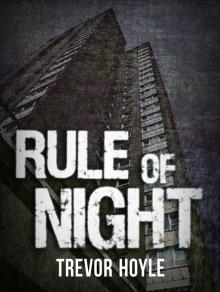 Rule of Night
Rule of Night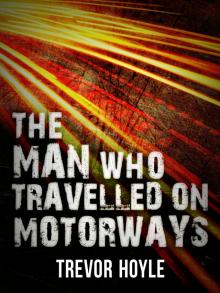 The Man Who Travelled on Motorways
The Man Who Travelled on Motorways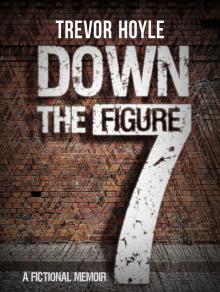 Down the Figure 7
Down the Figure 7 The Gods Look Down
The Gods Look Down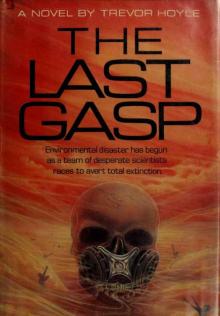 Last Gasp
Last Gasp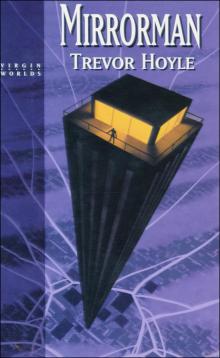 Mirrorman
Mirrorman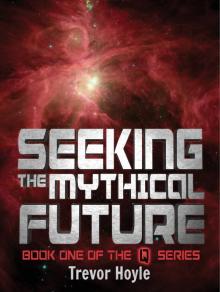 Seeking the Mythical Future
Seeking the Mythical Future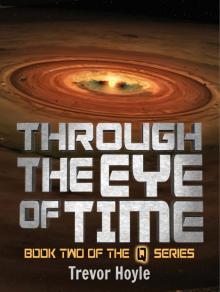 Through the Eye of Time
Through the Eye of Time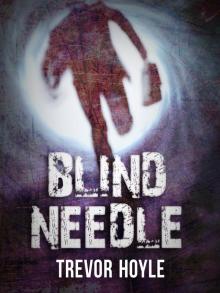 Blind Needle
Blind Needle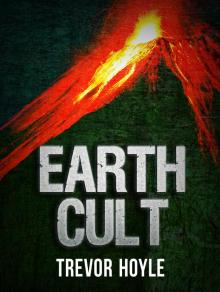 Earth Cult
Earth Cult